 Just over a week after a Dutch court gave 14 year old Laura Dekker permission to attempt to sail around the world alone, the teenager is setting sail. She will be sailing first from the Netherlands to Portugal with her father as crew. Her solo round the world attempt will start from Portugal at a date yet to be announced. One of the objections to her attempted round the world sail was that it will interfere with her schooling. Perhaps to assuage these concerns, Ms. Dekker has posted a photo of the school books she will be taking with her on her voyage on her blog.
Just over a week after a Dutch court gave 14 year old Laura Dekker permission to attempt to sail around the world alone, the teenager is setting sail. She will be sailing first from the Netherlands to Portugal with her father as crew. Her solo round the world attempt will start from Portugal at a date yet to be announced. One of the objections to her attempted round the world sail was that it will interfere with her schooling. Perhaps to assuage these concerns, Ms. Dekker has posted a photo of the school books she will be taking with her on her voyage on her blog.
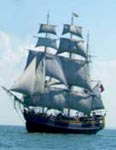
HMS Bounty
The Duluth Tall Ship’s Festival which runs through today, has been a major success, attracting over 200,000 visitors. One of the biggest “stars” of the event was the HMS Bounty. The wait to get on the Bounty averaged between two and four hours on Friday.
Not all the action was taking place on the Bounty however. Two of the 200,000 visitors were Erin Somers and RJ Johnson, who were married on the Pride of Baltimore II.
Ship that’s been in major movies is a hit at Tall Ships festival in Duluth
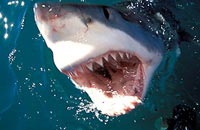 It is that time of year again. For twenty three of its twenty five years, the Discovery Channel, an American cable television channel, has celebrated this week as “Shark Week” with programming about sharks meant to thrill, terrify and no doubt, even inform its viewers. In the summer season, when viewership usually falls, “Shark Week” is consistently among the most popular programming on cable television. Despite its popularity it has not been without its share of controversy. Time Magazine recently published a history of “Shark Week:”
It is that time of year again. For twenty three of its twenty five years, the Discovery Channel, an American cable television channel, has celebrated this week as “Shark Week” with programming about sharks meant to thrill, terrify and no doubt, even inform its viewers. In the summer season, when viewership usually falls, “Shark Week” is consistently among the most popular programming on cable television. Despite its popularity it has not been without its share of controversy. Time Magazine recently published a history of “Shark Week:”
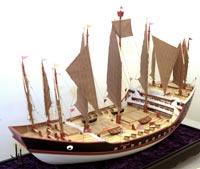 Zheng He’s fleet of ships has been the subject of mystery and myth for centuries. Now a joint Chinese-Kenyan expedition to excavate where one of his fleet is thought to have been sunk in the 15th century may finally shed light on the amazing exploits of the legendary Chinese navigator. Thanks to Alaric Bond for passing the article along.
Zheng He’s fleet of ships has been the subject of mystery and myth for centuries. Now a joint Chinese-Kenyan expedition to excavate where one of his fleet is thought to have been sunk in the 15th century may finally shed light on the amazing exploits of the legendary Chinese navigator. Thanks to Alaric Bond for passing the article along.
Experts set to unravel puzzle of a Chinese ship that sank near Lamu
Continue reading
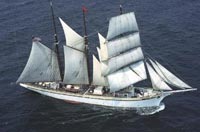 Philadelphia’s tall ship, the barquentine Gazela has returned to to sea after five years of being limited to protected water sailing due to a damaged rudder. With a new rudder, the turn-of-the-century Portuguese-built barquentine set sail from Philadelphia bound where she participated in a Portuguese festival in New Bedford, MA last weekend. She is due to return to Philadelphia in about a week and then depart a week later for New York Harbor.
Philadelphia’s tall ship, the barquentine Gazela has returned to to sea after five years of being limited to protected water sailing due to a damaged rudder. With a new rudder, the turn-of-the-century Portuguese-built barquentine set sail from Philadelphia bound where she participated in a Portuguese festival in New Bedford, MA last weekend. She is due to return to Philadelphia in about a week and then depart a week later for New York Harbor.
Philadelphia’s own tall ship heads back into service
Thanks to Tom Russell of the Traditional Sail Professionals Linked-in Group for passing on the news.
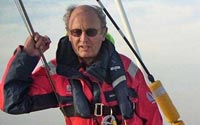 Lieutenant-Commander Colin de Mowbray
Lieutenant-Commander Colin de Mowbray
Lieutenant-Commander Colin de Mowbray , who died on July 11 aged 65, was a helicopter pilot and veteran of the Falklands war; in retirement he sailed on, and organised, round-the-world yacht races.
Continue reading
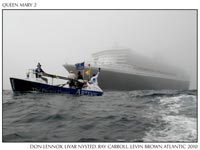
Artemis Rowing Team Crossing-paths with the QE2
On July 19th, we posted about the start of the Artemis North Atlantic Challenge when the Artemis Rowing Team set off from New York Harbor to break the 114 year old record for rowing across the Atlantic. The previous record had been set by Norwegian fishermen George Harbo and Frank Samuelsen, who rowed across the Atlantic in 55 days, the first on record to have successfully completed the voyage.
The new record set by the Artemis team is 43 days, 21 hours, 26 minutes and 48 seconds! Our congratulations to the Artemis Rowing Team captain and crew – Don Lennox, 41, from Glasgow; Ray Carroll, 33, from Galway and Livar Nysted from the Faroe Islands.
Rowers break 114-year-old north Atlantic crossing record
Continue reading
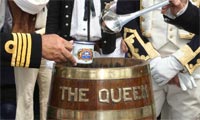 In early July we celebrated the 40th anniversary of the return of the SS Great Britain to Bristol. Yesterday was a more somber anniversary – the 40th anniversary of “Black Tot” Day.
In early July we celebrated the 40th anniversary of the return of the SS Great Britain to Bristol. Yesterday was a more somber anniversary – the 40th anniversary of “Black Tot” Day.
Ceremony to mark ending of rum tot at HMS Victory
Continue reading
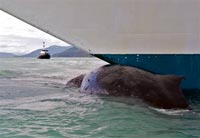 Last summer, the Sapphire Princess, a cruise ship operating on the South-West coast of Alaska, arrived in the port of Vancouver with a 70 foot long fin whale impaled on its bulbous bow. Wednesday, almost exactly a year later, another dead whale, an adult female humpback measuring 43 feet in length, was found pinned to bow of the same ship. This is the third reported whale strike by the company’s Alaska fleet in a decade.
Last summer, the Sapphire Princess, a cruise ship operating on the South-West coast of Alaska, arrived in the port of Vancouver with a 70 foot long fin whale impaled on its bulbous bow. Wednesday, almost exactly a year later, another dead whale, an adult female humpback measuring 43 feet in length, was found pinned to bow of the same ship. This is the third reported whale strike by the company’s Alaska fleet in a decade.
Dead whale found pinned to Alaska cruise ship
Continue reading
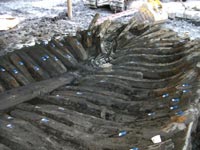 Two weeks ago the remains of an 18th century ship were found in the excavation of the World Trade Center site in Lower Manhattan. On Thursday Warren Riess, an archaeologist specializing in marine history, speculated that the ship was most likely a brigantine; the two-masted workhorse of the coastal trade. “It’s one of the ships that helped build New York.” It also now appears that work on a concrete wall last year may have inadvertently destroyed the after section of the ship.
Two weeks ago the remains of an 18th century ship were found in the excavation of the World Trade Center site in Lower Manhattan. On Thursday Warren Riess, an archaeologist specializing in marine history, speculated that the ship was most likely a brigantine; the two-masted workhorse of the coastal trade. “It’s one of the ships that helped build New York.” It also now appears that work on a concrete wall last year may have inadvertently destroyed the after section of the ship.
- Damage to the Hull Photo: Reuters
- Davit where lifeboat was knocked off by “explosion”
- Damage to Passageway
Photos of the damage to the VLCC MV M. Star. Click on the thumbnails above for larger images.
Questions Swirl About Damaged Japanese Tanker
Continue reading
- HMS Investigator Caught in the Ice 1854
- Sonar Image of HMS Investigator Photo: Parks Canda
The HMS Investigator was found in remarkably good shape in only 11 meters of water in Mercy Bay along the northern coast of Banks Island in Canada’s western Arctic. The image to the left is from a lithograph of the ship trapped in the ice in 1854 while the image to right is from the Parks Canada sonar scan of the ship on the bottom as she is today. The HMS Investigator, was caught in the ice and sank when on an expedition to search for Franklin. Click on either thumbnail for a larger image.
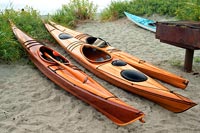 12th Annual West Coast Wooden Kayak Rendezvous
12th Annual West Coast Wooden Kayak Rendezvous
The annual West Coast Wooden Kayak Rendezvous (R2KX) is the first weekend in August at Fort Worden State Park in Port Townsend. The event is free and open to the public (donations to cover park fees gladly accepted).
Continue reading
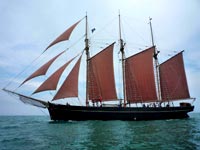
Kathleen and May
The Bristol Harbour Festival begins today and runs through the weekend. It is expected to attract over 200,000 people and is one of the biggest free events in the UK. In addition to Brunel’s SS Great Britain, on permanent display in Bristol, the harbor will be visited by the three-masted schooner Kathleen and May, as well as the Matthew, a replica of explorer John Cabot’s ship from 1497. Also visiting for the festival is the Vilma an ex Danish fishing boat from 1934, rerigged like an old Irish trading schooner.
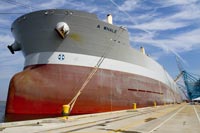 Lloyds List is reporting that the Skimmer “A Whale” which failed to collect significant amounts of oil in the Gulf of mexico from the BP spill is now en-route to the major spill in Dalian, China. The more concentrated oil on the water at Dailin may be better suited to the converted OBO’s skimming capabilities. Thanks to Michael Pryce on the Marine History List for the reference.
Lloyds List is reporting that the Skimmer “A Whale” which failed to collect significant amounts of oil in the Gulf of mexico from the BP spill is now en-route to the major spill in Dalian, China. The more concentrated oil on the water at Dailin may be better suited to the converted OBO’s skimming capabilities. Thanks to Michael Pryce on the Marine History List for the reference.
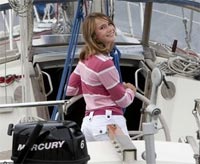 The teen-round-the-world-sailing-escapades may be starting all over again.
The teen-round-the-world-sailing-escapades may be starting all over again.
Laura Dekker has Dutch court permission to sail around the world
A Dutch court cleared the way Tuesday for 14-year-old Laura Dekker to embark on a risky attempt to become the youngest person to sail solo around the world, an adventure that could begin in the next two weeks.
Continue reading
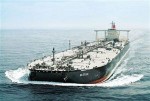 Depending on which of the various news reports you read, the MOL 314,016 dwt tanker M. Star suffered either an explosion, was hit by a grenade or was struck by a freak wave caused by an earthquake while transiting the Straits of Hormuz. An intriguing and developing story.
Depending on which of the various news reports you read, the MOL 314,016 dwt tanker M. Star suffered either an explosion, was hit by a grenade or was struck by a freak wave caused by an earthquake while transiting the Straits of Hormuz. An intriguing and developing story.
Giant Supertanker Suffers Mystery Explosion
Continue reading
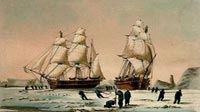 Earlier this month we posted about a new expedition by Parks Canada to search for Franklin’s ships, the Terrorand the Erebus. Parks Canada also intended to search for theHMS Investigator, a ship which was caught in the ice and sank when sent to search for Franklin. Today Parks Canada announced that they have found the HMS Investigator, apparently after a very brief sonar scan.
Earlier this month we posted about a new expedition by Parks Canada to search for Franklin’s ships, the Terrorand the Erebus. Parks Canada also intended to search for theHMS Investigator, a ship which was caught in the ice and sank when sent to search for Franklin. Today Parks Canada announced that they have found the HMS Investigator, apparently after a very brief sonar scan.
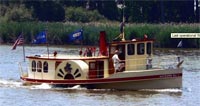 The Hiawatha, reportedly the last operational walking beam steam sidewheeler in the world, is being offered for sale on E-Bay. Built in 1983 of steel, the Hiawatha is 38 feet long with a 15.5 feet beam. Its paddle wheels are 7 feet in diameter and the ship has a top speed of 7 knots and cruising speed of 5 knots. She is currently in Bay City, Michigan.
The Hiawatha, reportedly the last operational walking beam steam sidewheeler in the world, is being offered for sale on E-Bay. Built in 1983 of steel, the Hiawatha is 38 feet long with a 15.5 feet beam. Its paddle wheels are 7 feet in diameter and the ship has a top speed of 7 knots and cruising speed of 5 knots. She is currently in Bay City, Michigan.
Historic Bay City steamboat Hiawatha up for sale on eBay
Thanks to Alaric Bond for pointing out the auction.
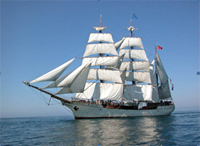
Barque Europa
Tall Ships Duluth 2010 has an impressive line up of ships scheduled for their tall ships festival. The ships are expected to start arriving in Duluth today. The Brig Niagara, the Barque Europa, HMS Bounty, the Pride of Baltimore II, the Roald Amundsen, the schooner Zeeto, the S/V Denis Sullivan, and the schooner Roseway will sail in a “Grand Parade of Ships” on Thursday afternoon with the tall ships festival getting into full swing Friday through Sunday.





